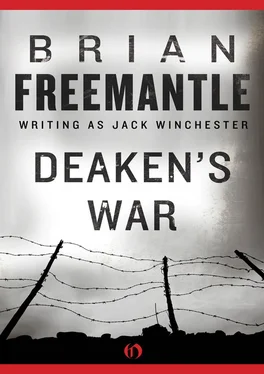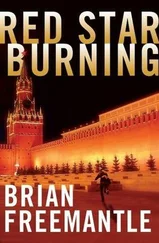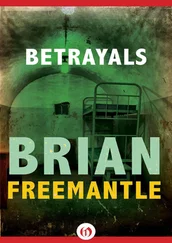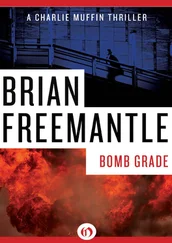Brian Freemantle - Deaken’s War
Здесь есть возможность читать онлайн «Brian Freemantle - Deaken’s War» весь текст электронной книги совершенно бесплатно (целиком полную версию без сокращений). В некоторых случаях можно слушать аудио, скачать через торрент в формате fb2 и присутствует краткое содержание. Жанр: Триллер, на английском языке. Описание произведения, (предисловие) а так же отзывы посетителей доступны на портале библиотеки ЛибКат.
- Название:Deaken’s War
- Автор:
- Жанр:
- Год:неизвестен
- ISBN:нет данных
- Рейтинг книги:4 / 5. Голосов: 1
-
Избранное:Добавить в избранное
- Отзывы:
-
Ваша оценка:
- 80
- 1
- 2
- 3
- 4
- 5
Deaken’s War: краткое содержание, описание и аннотация
Предлагаем к чтению аннотацию, описание, краткое содержание или предисловие (зависит от того, что написал сам автор книги «Deaken’s War»). Если вы не нашли необходимую информацию о книге — напишите в комментариях, мы постараемся отыскать её.
Deaken’s War — читать онлайн бесплатно полную книгу (весь текст) целиком
Ниже представлен текст книги, разбитый по страницам. Система сохранения места последней прочитанной страницы, позволяет с удобством читать онлайн бесплатно книгу «Deaken’s War», без необходимости каждый раз заново искать на чём Вы остановились. Поставьте закладку, и сможете в любой момент перейти на страницу, на которой закончили чтение.
Интервал:
Закладка:
La Grande Place in Brussels, and the cafu in the corner, is an essential stop for tourists, a place for posing, singly and in groups, for holiday pictures. The cafe is made entirely of wood, with wooden stalls and wooden benches and an uncovered, wooden floor. It rises through several balconied sections around the central, flaring barbecue pit and is dominated by the complete figure of a stuffed horse. Alive it had been a large, proud animal; dead it gazes through opaque glass eyes onto the square with an expression of vague dismay at having become a sideshow. Almost an entire side of La Grande Place is occupied by the town hall; the exterior is intricately decorated, with criss-crossed beams and fancy brickwork, like the original model for Hansel and Gretel’s gingerbread house. It was not the location that Harvey Evans would have chosen for a meeting, but the demand from Paris had been for somewhere easy to find and he was sure that every taxi driver in Belgium knew of the cafe with the horse.
The American sat in the prearranged stall, both hands around the beer glass from which he only occasionally drank. Twice he had to shake his head against his table being shared, with the explanation that he was awaiting a companion. It was always a polite refusal, because Harvey Evans was invariably polite. He was a still, quiet man, with a trained soldier’s neatness. The fair, almost white, hair was close-cropped at the sides far above his ears, and his hard, high-cheek-boned face was closely shaven, so carefully it seemed to be polished. The trousers were freshly pressed and the shoes glistened, reflecting the light from the flickering cooking area. Because he was leaning forward, the windbreaker was pulled back, so that the Rolex watch that had been the Green Beret amulet in Vietnam protruded; on the little finger of the left hand there was a heavy fraternity ring, with a red stone in the centre. Evans revolved it idly. thinking back to the telephone call from Paris. Abrupt and curt and businesslike, the voice confident. American too. So it could be something, he thought. Something worthwhile. He hoped to Christ it was. Since Libya there hadn’t been anything sensible. And Libya had been an asshole. Evans sighed. Like everything else had been an asshole, since ‘Nam. They hadn’t deserved the treatment, when they got back; none of them had. He hadn’t wanted to be regarded as a hero, although he probably qualified with the Purple Hearts and the Silver Stars and all the other junk he and the others had collected, too easily in the end, like trinkets for having saved up cardboard tops from breakfast-food packets. All he wanted was to be accepted as the soldier he had become, someone who had shown sufficient aptitude and ability for promotion to one of the youngest majors in the Berets. But he hadn’t got it; none of them had. They had gone halfway around the world and risked being maimed or crippled or killed and got back home to find themselves ostracized, treated with contempt even. As if they and not some asshole group of politicians sitting in the warmth and comfort of Washington had started the whole bloody thing and made America look as stupid and as ineffectual as it had appeared in the end. It hadn’t occurred to him before, but there was a direct analogy with the military legend: the commanders fuck it up and the poor grunts in the boondocks cop the shit.
Evans had been studying every entrant-he had chosen the seat specifically for the purpose-and looked at Grearson more intently than he had at most others. The man was alone. Had an attitude of authority, which Evans recognized from the army. And the clothes were American, like the voice had been on the telephone. The man looked around, orienting himself, and walked directly up to the stall.
“You’re Harvey Evans,” he said. It was not a question.
Evans stood, aware of the immediate examination. “Yes,” he said. Grearson liked what he saw. The man was in good shape, unneglected. And no beer belly, he thought, remembering Azziz’s injunction.
“Sorry I’m late,” apologized the lawyer. “Delay at the airport.”
The soldier’s handshake was firm, without any ridiculous pretence at making it so.
“I didn’t mind waiting,” said Evans. “You spoke of a job.”
“Maybe,” said Grearson cautiously. He ordered whisky.
“How did you get my name?”
“Paris.”
“That’s a city,” said Evans. “Who in Paris?”
“People who recommended you as being very good.”
“What sort of people?”
“The sort who deal in weaponry.”
They had seemed the most obvious contacts when Evans moved into Europe from the Middle East. He supposed he must have contacted about six different arms-dealing organizations.
“Which one?”
“That’s not important, not for the moment,” said Grearson. “I want to be sure first.”
“Of what?”
“Your suitability.”
“What do you want to know?”
“Everything about you.”
The lawyer’s drink arrived. He put it before him untouched and Evans realized it wasn’t to drink, merely to entitle him to occupy the seat in the stall. Evans gave a clipped official recital of his career, as if he were reading from the formal documentation which still existed somewhere in Fort Bragg.
“Why did you leave in ‘78?” Grearson fingered his spectacles.
“I didn’t like the atmosphere,” said Evans. “Wherever I went… said who I was… I was made to feel as if I was guilty of something.”
Grearson nodded, aware of the attitude that existed in America in the immediate aftermath of the mistaken war.
“Why not a civilian job?”
“Don’t have the training,” said Evans. “I’m a soldier, that’s all I’ve ever been. Ever wanted to be.”
“What then?”
“Heard there was opportunity in Libya. Training their people… guerrillas, too, from other countries. Spent almost two years in a camp near an oasis called Kufra…” He shook his head at the memory. “Christ, what a place!”
“What was wrong with it?”
“Prayers to Mecca God knows how many times a day, political indoctrination sessions and stupid bastards shooting off guns and throwing grenades and believing they were immortal so it didn’t matter if they got hit.” Evans stopped. “No booze or women either. Like being a goddamned monk.”
Grearson analysed what the other man said before speaking. “You got anything against Arabs?” he said.
“Do you mean am I Jewish?”
“Are you?”
“No.”
“So what about Arabs?”
Evans shrugged. “Nothing wrong with Arabs,” he said. “That wasn’t what pissed me off about Libya.”
“What did then?”
“They’re crazy. They really do believe what their priests tell them, that Gaddafi is leading them into some sort of holy conflict, they can’t be killed.”
“Booze important to you?”
“Booze?” frowned the man.
“You said there wasn’t any booze. Or women.”
Evans smiled apologetically. “I don’t drink or whore any more than anyone else,” he said. “But I was there for two years!”
Grearson smiled back. “What have you done since then?”
“Nothing.”
He had been lucky first time, Grearson decided. He pushed a sealed manila envelope across the table. “There’s $1000 retainer, with another $500 for expenses.”
Evans picked the envelope up, felt it and put it into an inside pocket of his windbreaker. “What do you want?”
“You formed a deep-penetration unit in Vietnam.”
“Yes.”
“How many men?”
“It varied,” said Evans. “Usually it was six.”
“What sort of opposition could you handle?”
Evans smiled again, proudly this time. “A platoon or company any time,” he said. “Frequently happened, in fact. We were well trained.”
Читать дальшеИнтервал:
Закладка:
Похожие книги на «Deaken’s War»
Представляем Вашему вниманию похожие книги на «Deaken’s War» списком для выбора. Мы отобрали схожую по названию и смыслу литературу в надежде предоставить читателям больше вариантов отыскать новые, интересные, ещё непрочитанные произведения.
Обсуждение, отзывы о книге «Deaken’s War» и просто собственные мнения читателей. Оставьте ваши комментарии, напишите, что Вы думаете о произведении, его смысле или главных героях. Укажите что конкретно понравилось, а что нет, и почему Вы так считаете.












